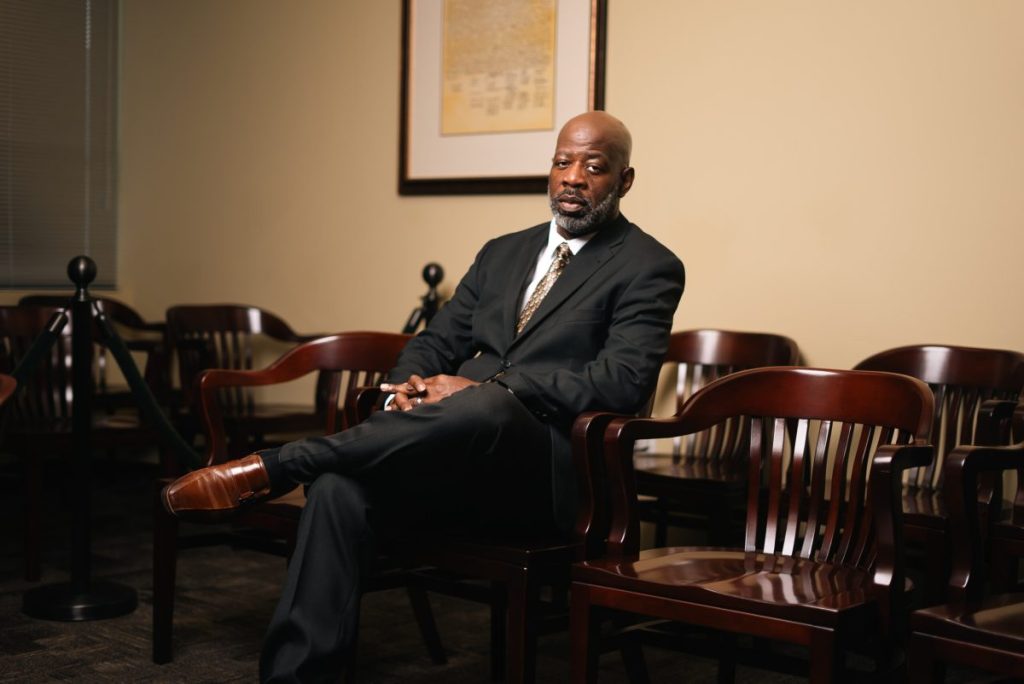By Christine Won
PVAMU
For Dr. Kareem Jordan, the newly named Dean of the College of Juvenile Justice (COJJ) at Prairie View A&M University, his interest in juvenile justice began as a child fortunate enough to attend a “better” school.
Growing up in an underserved area of Philadelphia, he observed notable differences between the schools in his neighborhood and the one he attended in an area with “stronger schools,” thanks to his wise mother’s insistence.
“I noticed the kids in that school had better resources than the schools in my neighborhood, which I thought was unfair and wrong,” he said, adding he often saw kids in his neighborhood getting into trouble with authorities, unlike his school peers. “Over time, I started asking myself why some kids got in trouble while others did not and who was at fault. Were the kids in my neighborhood actually getting in more trouble, or was the ‘system’ built in a way that made it seem like kids in my neighborhood were getting in more trouble? That question sparked an interest in me and led to my interest in juvenile justice.”

It paved the way for his career trajectory to a PhD in criminology from Indiana University of Pennsylvania, where his doctoral dissertation focused on the practice of prosecuting juveniles in the adult criminal justice system.
“As I researched more issues in juvenile justice, my love for this area grew,” he said. “I love the area of juvenile justice because our work directly impacts the lives of youth, which can change their lives and ultimately change the world.”
With that vision, he became PVAMU’s COJJ Dean this summer.
A point of pride for Jordan in his new position is that the College of Juvenile Justice had the first doctoral program in juvenile justice in the United States. “I want our college to be one of the strongest and healthiest colleges not only at PV but in the nation,” he added.
Jordan has already set objectives for his administration at the college, from increasing enrollment to expanding programs. He also envisions maximizing the college’s impact, especially the Texas Juvenile Crime Prevention Center, in the state of Texas.
“Our college is uniquely positioned to help address the challenges facing the juvenile justice field,” said Jordan, who also serves as executive director of the TJCPC. “Some challenges faced by the system include creating and evaluating intervention programs, Black and Latino youth being disproportionately represented in the system, and the lack of mental health resources for justice-involved youth.”
Previously, Jordan served as director of Diversity & Inclusion in the School of Public Affairs at American University in Washington, DC. Prior to that, he served as a graduate director in the Department of Justice, Law, and Criminology at AU, where he directed multiple programs, including the PhD program and two master’s programs (i.e., criminology and terrorism/homeland security policy).
With over 20 years of teaching experience, Jordan has taught across the spectrum of criminal/juvenile justice courses, including corrections, theory, methods, systems, and policy. He has also served as graduate director at the University of Massachusetts Lowell, the University of Central Florida, and the University of North Florida.
Through these key leadership positions, Jordan has honed his knowledge, skills, and experience in focus areas such as faculty/staff/student recruitment and retention, student-centered pedagogical practices, academic assessment, curricula revisions, and strategic planning.
Jordan, whose research focuses on juvenile justice and race/justice issues within the criminal justice system, has published dozens of articles in the field’s top journals, including Race & Justice, Journal of Crime and Justice, Crime & Delinquency, and Criminal Justice & Behavior, as well as in multiple scholarly books. He also serves on the editorial boards for leading journals: The Prison Journal, Journal of Crime and Justice, and Criminal Justice Policy Review.
Across his achievements, his driving motivation has remained the same since childhood: to break the cyclical nature of the justice system.
“Many times, the most underserved communities in Texas and elsewhere are more likely to experience those factors that increase delinquency, such as lack of resources, lower-paying jobs, and a lack of investment in public education,” he said. That cycle continues when those living “in those communities are also likely to be viewed negatively by those who work in those formal systems, such as education, law enforcement, social services, etc.”
Jordan continued: “The mission of the Center allows us to work with these communities, help target those factors, and decrease the likelihood of these youth becoming system involved. It’s rewarding work.”




